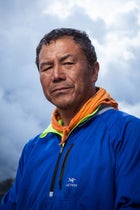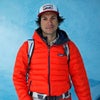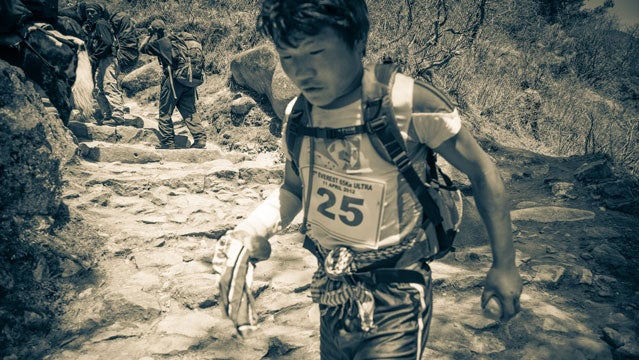On the morning of April 11th, on my way between the Himalayan villages of Monju and Namche Bazar, I was passed by a thickly built Nepalese pounding by at a dead run. The isn’t until May 29 (the day Tenzing and Hillary summited); this was the second edition of its more difficult cousin, the 65K . At 6 a.m., 33 competitors—11 international and 22 Nepalese—started out just south of Everest Base Camp at Gorek Shep and raced all the way back to Lukla, where trekkers and climbers fly in from Kathmandu. The route rolls a bit, but mostly it descends a knee-crushing 8,000 feet over a granite-cobbled trail mined with porters, trekkers, yaks, and road apples.
 The second annual Everest Ultra.
The second annual Everest Ultra. Ramesh Bhattachan, the Alberto Salazar of Nepal.
Ramesh Bhattachan, the Alberto Salazar of Nepal.The runner I saw was 24-year-old Sudip Kulung, and he covered the distance in five hours. I learned this from Supid’s coach and race director, Ramesh Bhattachan, when I met him in the village of Namche Bazar. Bhattachan, who was also racing, stopped for lunch at the Panorama Hotel. It turns out Sudip used to be a porter shuttling loads between Lukla and Everest Base Camp. When he saw a sign in Base Camp for the inaugural Everest Ultra, he dropped off his load and ran back to Gorek Shep, where the race was about to begin. He asked Bhattachan if he could enter.
“I looked at him to see if he was fit,” says Bhattachan. “He was a porter, so I said, OK, You can run.” Sudip won the race. Bhattachan, a British Army veteran who could be called the Alberto Salazar of Nepal, offered to coach Sudip back in the city of Pokhara, where he trains a group of elite mountain runners. “His form was terrible,” says Bhattachan, “I gave him scientific training.”
A month after their first meeting, Sudip entered the shorter but more competitive Everest Marathon and placed second. The following year, he won it. At the 2011 in Davos, Sudip placed 28th. Bhattachan may have been able to raise the money to get his top runner to Switzerland, but don’t expect to see Sudip at this year’s Leadville or the Western States 100. “We can’t find a sponsor,” Bhattachan told me. Then he finished his water, handed me a business card, and trotted off toward Lukla.


